On 16 May 2015 Trevor Stephenson (1 North, 1929-31) died at the age of 100. In Contact No 39 (March 2009) I quoted his reminiscences of his last days at Cranleigh. Here is part of his description of his first:

Early one January morning in 1929, I went with my father to Birkenhead station where we caught the train for Cranleigh then a taxi to the school. Upon arrival we were directed to the room of the Headmaster, the Rev Rhodes. Father introduced himself and then added “Here is my son Trevor”. The Headmaster told my father he could now go home so he gave me a pat on the back, said “Be good and work hard” and disappeared.
The Head took a long look at me saying “Here you will be known as Stephenson Segundo”. Calling one of the boys, he told him to take me to my House Master Mr Purvis, a large man with a powerful voice. After a few words of welcome, I was informed that I would be receiving pocket money of 1/6d per week, that I should write home once a week and obey the rules.
The 1 North houseroom was in an ex-army hut on the North field. There were gas fired radiators along one wall and a row of lockers along another wall. The room was also used for classes. Our bedroom was on the second floor on the north side of the Quad. Beside each bed was a square box to hold our clothes. On each bed was a red blanket. In the middle of the room were some two dozen steel basins each with a single tap for cold water.
The first night one of the house prefects, Poole, called me and said that he had chosen me to be his ‘fag’, and that I was to put his travel rug on the bed, run errands and bring him a jug of hot water each morning for washing.
During the first week, I was called to the chapel where the music master, Mr Allen, played a few notes on the piano and told me to sing them. I never knew I could sing but he told me that I was to be a member of the choir. There was only one boy about my size, Barbosa Segundo, so the two of us led in the choir and continued to do so until I left in 1931.
We all had Tuck Boxes which in 1 North were kept in a room over what was said to have been a swimming bath along the corridor leading to the music rooms. I brought lots of goodies from home and for my birthday both my mother and grandmother sent me cakes. I used to bring a small tin of condensed milk which I would suck from time to time. Great days!
The lavatories left a little to be desired. They were near to the Fives Courts. There were a number of cubicles without doors. Lavatory paper was scarce so it was the custom to grab an extra lot and carry it in your coat pocket.
February 1929 was a terribly cold winter when everything seemed to freeze. The cold water faucets in the dormitory froze but we could obtain hot water in tin jugs from a tap in the corridor. Some nights were so cold that I went to bed fully dressed and with my overcoat on top of the bed. The first two classes in the morning were cancelled and we went on the Gatley’s Wyphurst Pond to slide and skate. We attended chapel dressed in our overcoats. The milk at breakfast contained lumps of ice. The ink froze in the ink pots so we did our lesson in pencil. The only warm place was said to be the Sanatorium.
Scarlet Fever had broken out and a number of boys were already in the Sanny. I wondered how I could get there too. One morning whilst getting dressed, I beat my chest with my hair brush till my chest was a mass of pink spots. As soon as breakfast was over, I went to the sick room, reported that I was covered with spots and it was Scarlet Fever. The matron had a look but could see nothing so I was dispatched. The next day just before leaving the hall after breakfast, I filled my mouth with hot tea. Then to the sick room. The matron gave me a thermometer and told me to pop it in my mouth. Swallowing the tea rapidly I did as I was told. A few minutes later the matron looked at the thermometer. It was well over 40 degrees. I was instructed to collect my pyjamas and dressing gown and go immediately to the Sanatorium. Wonderful! The Sanny was indeed delightfully warm. I got into bed and prepared to spend the next few days or weeks in this lovely warm atmosphere. Alas! When the doctor came round and took my temperature and it showed ‘normal’. I was quickly sent back to the school.
Friday nights were bath nights. In lots of twelve, we were taken along draughty corridors to the baths. This consisted of a large room with iron baths along two sides. At the far end were narrow windows without any glass and so open to the wintery wind and air. Along the fourth wall were several statues. In the middle was the swimming pool. Upon arrival, we got out of our pyjamas and into very hot water in the iron baths. Then the prefect on duty would shout “All out”. We would clamber out and run, naked and red from the hot water, to the deep end where the prefect stood waiting, stick in hand. We had to jump into the swimming pool. If we dallied, we received a whack on our bottoms. On the coldest Friday night in February, dressed in our pyjamas and dressing gowns, we were marched to the swimming pool. The usual very hot bath, then the order “Out”. I was the first in line so went to the end of the pool. I could see a thin layer of ice on the surface of the water. I hesitated, then came the whack and I jumped in. I have never swum so fast in all my life.
When we returned to school for the summer term in 1929, our dormitory now had its own bathroom with toilets, showers and wash basins with hot water. No more treks to the swimming pool. We also had electricity instead of gas with the exception of the Huts on the North field which continued with gas for several terms more.
 The 1 North house room was now in the new Connaught building at the far end. The room was complete with new lockers and partitions, known as ‘toyes’ for fifth formers. Prefects had their own rooms in the first floor.
The 1 North house room was now in the new Connaught building at the far end. The room was complete with new lockers and partitions, known as ‘toyes’ for fifth formers. Prefects had their own rooms in the first floor.
The new buildings were to have been officially opened on 8 June 1929 by HRH the Duke of Connaught but owing to a delay in completion, they were actually officially opened on 27 July by the Archbishop Lord Davidson of Lambeth.
Another thing I hated was PT in the open that cold winter. One day Mr Allen told several of the choir and myself to go to the gym for choir practice instead of doing PT. Now I had the excuse I needed so henceforth I did no more PT always saying “I have to do choir practice in the gym!” Being in the choir we went on a Choir Treat each year. One year we went to the Isle of Wight. With another boy, we hired a rowing boat. Unfortunately neither of us was very good at rowing, the current caught us and we banged into the King’s yacht much to the annoyance of the sailor in charge. Another time we went to Portsmouth and went over the “Victory”.
Being so small, I found cricket bats and hockey sticks rather difficult to use so more often than not, I was not chosen to play. I was told to go for a run or use the gym. When there were 8 or 9 of us not chosen to play in a team, we would play hockey on the asphalt by the gym. There was a Fives Court and I enjoyed playing there. The result of all this was that I did not excel at games. Little did I think that after leaving school I would be playing hockey for Oxton Hockey Club and, when I was in Sao Paulo, Brazil, captain the Sao Paulo Athletic Club.
All boys had to join the Officer Training Corps (OTC). Corps days were Mondays and Fridays. My problem was that being small, my rifle was apt to stick in the nose of the boy behind me. Something had to be done. It was decided that in future I should be a member of the band. I was not at all good at blowing a bugle and several times was called out to play some notes. No good so I was given a triangle to play. In 1930 I was kicked out of the band and once more joined the House Platoon and took place in a number of parades. I enjoyed shooting and caused a little excitement when I changed from shooting right to left shoulders half way through a shooting session.
Before the new Speech Hall was complete, Ben Greet and company [Sir Philip Barling “Ben” Greet was a Shakespearean actor, director, and impresario] came to the school and gave several plays in the Quad. One of the plays was Richard II. Later we had a history lesson when we had to write about Richard’s life. I did so badly that I was given detention. I wrote in my diary “Wish Richard had died when he was a boy!”
When the new Speech Hall was complete, several concerts were held there. It was not obligatory to assist although I usually did. Later when Michael Redgrave arrived as a teacher, a number of plays were put on including Trial by Jury in which I took a part.
In 1931, boys were asked whether Drill in the Quad should be continued or replaced by beatings. Almost universally we declared that we preferred to be beaten than do half an hour or an hour’s knees up in the quad. Drill continued however. It was not long after this that I was ticked off for being late at roll call. Instead of half an hour in the quad, I was instructed to appear at the study of a House Prefect where I received three whacks on my behind. Drill and/or 100 lines were given both by the Masters and Prefects depending upon the seriousness of the act.
In March 1930 I was blessed by the Headmaster and two days later I was Confirmed in the Chapel receiving a small red prayer book which I still have.
In East House was a son of the famous artist Heath Robinson. One day I was going down the corridor not looking where I was going when I bumped into Quentin Heath Robinson Terca. A Senior Prefect of East House, he was the third of the Heath Robinson boys to go to Cranleigh. He told me I should always look where I was going but instead of giving me 100 lines to write “I must not walk in the corridor with my eyes shut”, asked me about myself and then wrote a short verse about me reading

There is a chap in 1 North House
He is no larger than a mouse,Stephenson, they say he’s named
And though as yet not widely famed
In corridors he’s often found
Walking deep in thoughts profound.
Later his father wrote me a very nice letter attaching one of his drawings of me running after a bird with a butterfly net.
When I moved into the 4th Form, I was given the choice of learning Greek, German or Spanish. I found Greek far too complicated as non-English letters were used. German used a peculiar type of script so I chose Spanish. It was not a success. I preferred Latin which I used on several occasions whilst in Brazil especially when conversing with priests of the Cathedral in Sao Luiz.
In December 1931, I left Cranleigh having just managed to pass my School Certificate exams. I had not made any impression on Cranleigh but Cranleigh left a great impression on me. It taught me discipline, self-confidence and a certain amount of tolerance all of which stood me in good stead when I went to South America.

